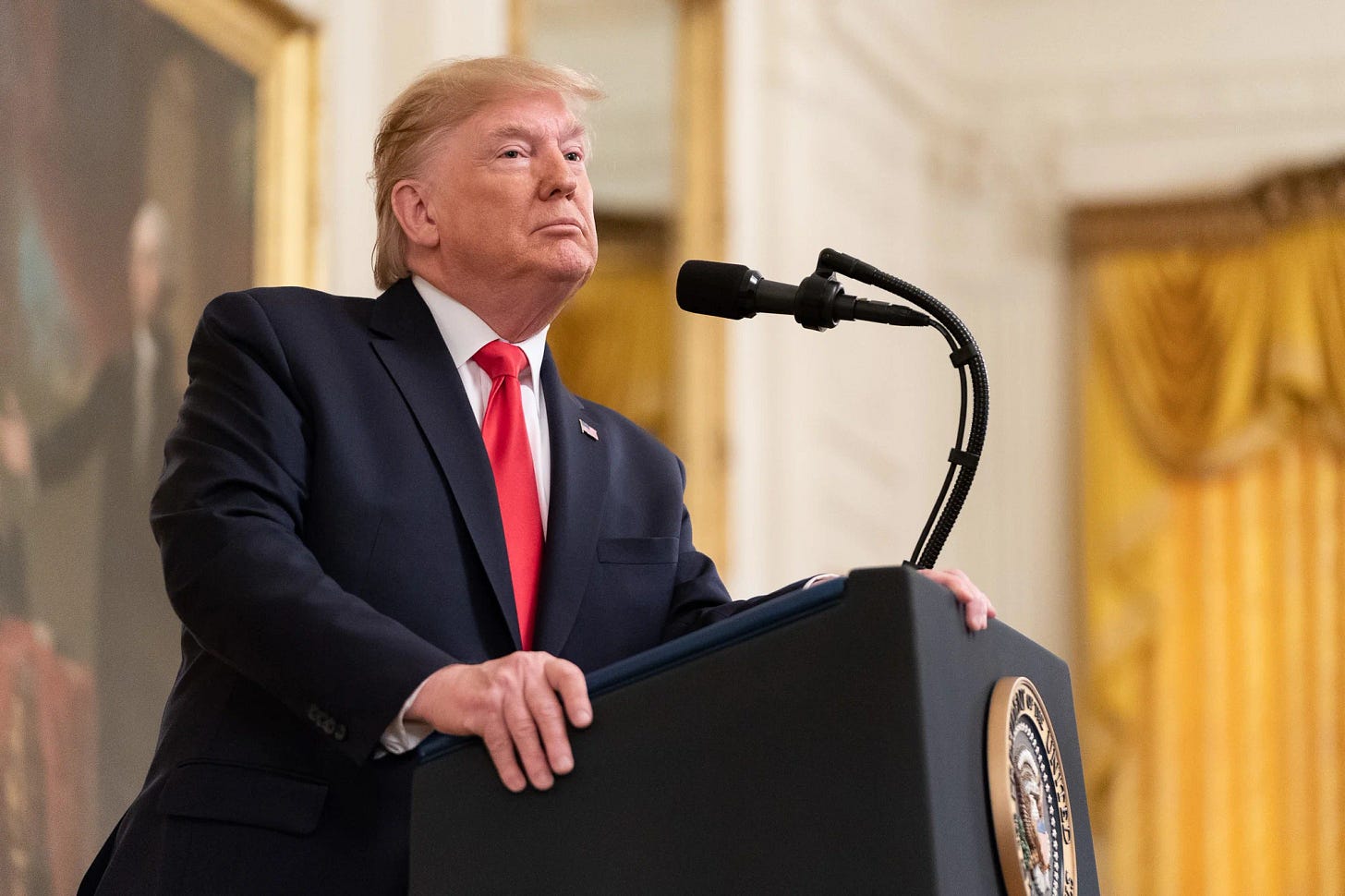Trump’s Foreign Policy Direction and Its Impact on African States
A Merged Narrative and How African States Can Adapt
President Donald Trump giving remarks. Image source: Official White House Photo by Shealah Craighead.
Since his initial ascendancy to the White House, Donald Trump has exemplified an “America First” philosophy that has shaped U.S. foreign policy on multiple fronts—trade, aid, security, and immigration. During his first term, this stance resulted in executive orders that affected various African nations, including restrictions on immigration from select countries and proposals for budgetary cuts to development programs under USAID. At the same time, initiatives like “Prosper Africa,” launched in 2019, hinted at an interest in boosting commercial relations between the U.S. and the continent. Despite that intention, critics noted a lack of sustained investment or focus relative to initiatives championed by prior administrations.
Now, with the White House issuing a new executive order on January 20, 2025, the contours of a second Trump term’s foreign policy in Africa are becoming clearer. The executive order effectively pauses all new obligations and disbursements of U.S. foreign development assistance for ninety days, pending reviews on whether these programs truly align with American interests and values. The order states that “the United States foreign aid industry and bureaucracy are not aligned with American interests and in many cases antithetical to American values” and emphasizes that any future aid must be “fully aligned with the foreign policy of the President of the United States.” This pause grants the administration latitude to reshape, curtail, or even eliminate development programs—some of which have long served as lifelines for vulnerable communities across Africa.
From an African perspective, this signals both continuity and change. Continuity lies in President Trump’s inclination to view aid, trade, and security assistance through a transactional lens. Change arises from the possibility of more sweeping revisions than seen during his first term, when aid structures were often criticized but never completely discontinued. As departments and agencies undertake their ninety-day reviews, African leaders and civil society organizations must closely track which programs might be paused or ended. Where possible, they should appeal for waivers offered under Section 3(e) of the order, especially for initiatives tied to life-saving medical assistance, emergency relief, and critical infrastructure.
In many respects, the current moment echoes challenges from Trump’s previous immigration restrictions—often dubbed “travel bans”—that affected nations such as Somalia, Sudan, and Nigeria. Governments then had to engage in diplomatic back-and-forth with U.S. officials to safeguard their interests. Similarly, African economies that leveraged the African Growth and Opportunity Act (AGOA) or sought bilateral deals found themselves vying for attention against other global priorities, including the President’s interest in renegotiating trade relationships. Today’s pause could reignite similar anxieties, particularly among nations that benefited from health, agriculture, or education funding.
At the same time, the new executive order reveals a desire to align every facet of American foreign aid with the current President’s worldview. While that could streamline certain programs—if deemed strategically beneficial to the United States—there is also the risk of systemic funding gaps in crucial social programs. For instance, if local NGOs in Africa lose access to health or educational grants, vulnerable populations may suffer setbacks in access to services. This scenario is particularly concerning given Africa’s ongoing youth demographic boom and the need to maintain job creation, stable governance, and robust social welfare systems.
Yet, opportunities remain. The White House’s emphasis on “programmatic efficiency” could prompt African states to demonstrate clear outcomes and transparency in how development funds are used. Governments that provide robust data on the efficacy and accountability of U.S.-backed programs may have a stronger case for resuming or retaining their funding. Additionally, states that pivot to diversified partnerships—whether through European Union support, intra-African cooperation such as the African Continental Free Trade Area (AfCFTA), or investment from emerging economies—will be better positioned to handle potential shortfalls from changing U.S. commitments.
On the global stage, this development also underscores the interplay between foreign policy and social justice. Historically, U.S. foreign assistance, while not without controversy, has played an important role in helping marginalized communities address systemic challenges, from healthcare to basic education. A disruption or significant reorientation of such funding can have a profound impact on social justice efforts, compounding disparities in regions already grappling with governance and humanitarian hurdles. Civil society groups within Africa may increasingly need to seek local funding, philanthropic partnerships, or private capital to compensate for reductions in American-supported programs.
In summary, the executive orders signed under President Trump’s first term, combined with the January 20, 2025 directive, reveal a consistent preference for tightening the oversight of aid, focusing on bilateral deals, and emphasizing U.S. national interests above multilateral collaboration. While one must respect the prerogative of any U.S. administration to determine its foreign policy, the shift in aid directives requires African leaders to be vigilant, strategic, and flexible. With thoughtful engagement, transparent governance, and diversification of alliances, African states can navigate these changes and even transform them into opportunities for independent growth.
How African States Can Adapt
Strengthen Accountability
Maintain high standards of transparency and reporting for current and past U.S.-funded projects to demonstrate efficiency and alignment with stated objectives.Diversify Partnerships
Seek additional partnerships within the African Union, the European Union, Asia, and philanthropic entities to reduce over-reliance on any single external power.Engage Diplomatically
Use established channels—including embassies, think tanks, and diasporic communities—to communicate with U.S. policymakers, emphasizing the mutual benefits of stable, well-supported African societies.Invest in Local Capacities
Develop robust domestic funding mechanisms for crucial sectors like healthcare, education, and infrastructure. Strong homegrown solutions lessen the impact of external policy shifts.Advocate for Waivers
Identify critical programs and lobby early for exemptions or waivers under the executive order’s provisions, leveraging data to show that continuing funding aligns with shared goals.
#InclusivePolicy #USForeignPolicy #TrumpAdministration #ExecutiveOrder #AidPause #PolicyReview #AfricaGovernance #SocialJustice #DevelopmentAssistance #AmericaFirst #GlobalDiplomacy #SustainableDevelopment #PublicPolicy #NGOs





